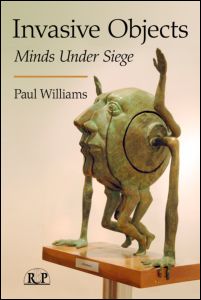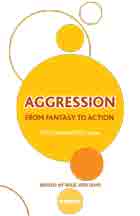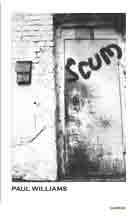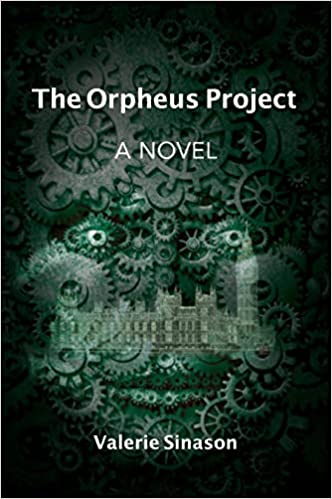The Fifth Principle

Book Details
- Publisher : Routledge
- Published : 2010
- Cover : Paperback
- Pages : 128
- Category :
Selected Fiction, Biography and Memoir - Category 2 :
Psychoanalysis - Catalogue No : 28852
- ISBN 13 : 9781855757899
- ISBN 10 : 1855757893
Also by Paul Williams
Invasive Objects: Minds Under Siege
Price £41.99
Aggression: From Fantasy to Action
Price £28.99
Our Customers Average Rating
Read all reviews (1)





The Fifth Principle is the first of three books that take as their subject aspects of the author's life. This book reflects upon a period between birth and eight years of age; the second book will address adolescence and the third, adulthood. It would be misleading to consider what follows to be autobiography, or the "case history" of an individual. The author of the book, and the individual written about, are not the same person. It is a piece of literature that furnishes an account of the methods of a mind in its efforts to prevail in oppressive circumstances.
Reviews and Endorsements
One might say that the author has undertaken, on behalf of the subject, to provide a faithful, intelligible account of unintelligible events. The mind in question, in so far as it resembles other minds, will speak to the reader in ways that are recognisable, though some of the things that are written about may be unfamiliar. The extent to which the narrative finds a home in the mind and the imagination of the reader will be the measure of its worth.
'The Fifth Principle is an unassuming literary gem. The writing is spare, highly charged, quietly explosive. Williams looks unflinchingly into his experience as a child, finding there a soul struggling to survive, or perhaps more accurately, trying not to allow the little bit of life that remains to be extinguished.'
- Thomas Ogden
'Paul Williams writes of a childhood devastated by lovelessness, disconnected from the real world, under the sway of fear and rage. His searching and deeply affecting confession deserves a place on the bookshelf beside Marie Cardinal.'
- J. M. Coetzee
'The mystery is that he survived, and what is more survived as a talented, intelligent, resourceful person. A masterpiece.'
- Eric Rhode
About the Author(s)
Paul Williams is a training and supervising analyst with The British Psychoanalytical Society and a member of the Royal Anthropological Institute. He was a consultant psychotherapist in the British National Health Service, retiring in 2010. From 2001-2007 he was Joint Editor-in-Chief, with Glen O. Gabbard, of the International Journal of Psychoanalysis. He has published widely on the subject of severe disturbance. He lives and practises in Hampshire, UK.
Customer Reviews
Our customers have given this title an average rating of 5 out of 5 from 1 review(s), add your own review for this title.
Elisabeth Hanscombe PhD on 22/06/2017 00:18:24




 (5 out of 5)
(5 out of 5)
Paul Williams prefaces his book, The Fifth Principle – the first of three to constitute his memoirs – with the following words, ‘The author of the book, and the individual written about, are not the same person…’ (p.9). Williams thereby gives voice to the notion that when we write about our past we write about it from a different persona, namely that of the adult who looks back. The author and the narrator, the child whose story his adult self tells, are not the same. Williams goes on to describe his book as ‘a piece of literature that furnishes an account of the methods of a mind in its efforts to prevail in oppressive circumstances…’(p.9). In this way he offers a psychoanalytic glimpse into the world of his troubled child-self through the lens of his later experience.
While I was reading, and in spite of my desire to keep my copy unsullied for posterity, I found myself underlining whole paragraphs of Williams’s book. So many of his words speak to me. They are like gems of light in the darkness of an otherwise horrific childhood. As Eric Rhode writes on the book’s back cover blurb ‘the mystery is that he [Williams] survived, and what is more, survived as a talented, intelligent, resourceful person’. Even more than these adjectives suggest, Williams is an outstanding psychoanalyst and writer, who from 2001-2007 was editor in chief with Glen Gabbard of the International Journal of Psychoanalysis.
Williams continues in his preface, ‘The author has undertaken, on behalf of the subject, to provide a faithful, intelligible rendering of unintelligible events’(p.9). He hopes however that the ‘mind in question, in so far as it resembles other minds, will speak to the reader in ways that are recognisable…and the extent to which the account finds a home in the mind and imagination of the reader will be the measure of its worth’(p.9). As one reader who resonates with the poignancy and almost unbearable load of pain in this account, I am especially grateful to Williams for his ability to bring to life his experience of childhood shame.
It is as if Williams writes his own case history, in some ways following in the footsteps of Freud, though unlike Freud, Williams does not disguise his identity behind the third person. In this sense Williams’s writing demonstrates how useful it is for a psychoanalyst to come out from behind his professional role and life to write a memoir.
Williams divides his short book into several sections to cover the broad themes of memories, wrong, school, badness, lies, hunger, drugs, murder, and finally, The Fifth Principle. Throughout the book, he elaborates on his five principles, which Williams adopted throughout his childhood into adulthood from his earliest memories onwards. These principles can be considered defensive renderings of his basic attempts to survive a relentlessly cruel mother and a feckless and largely absent, alcoholic father. The writing is spare, polished and intelligent, almost poetic in its tendency towards understatement.
The reader is left to shudder at the life Paul Williams led, such an eloquent man today, such a silent boy then, whose mother hates him from the moment of his birth because he is not the daughter, Carole, to whom she had previously given birth but later lost. Spurned as well by his father, the boy learns, even as a three year old, to keep himself invisible. He scavenges for food and spends much of his time alone in the woods.
In order to survive Williams develops other strategies based on the five principles in his mind. These principles include the notion that ‘nothing is true’, that ‘everything’ he does ‘is wrong’, that anger will keep him alive, and in time if he ‘works twice as hard as anyone else then he might be able to live a life that approximates a normal life’(p.127). It is Williams’s final and fifth principle, developed later in his life, that takes my fancy. We read the words at the beginning of the book – Principle Five :‘Fuck it’ – but there at the beginning, tacked onto the end of the other four principles, it seems to be very much connected with similar nihilistic impulses. It is only when we get to the end of the book and several years into his adulthood that Williams offers a different meaning to the words ‘fuck It’(p. 122). And this meaning appeals to me. It is all in the intonation. The Fifth Principle enables Williams to undo the previous four.
Through the experience of his writing, and presumably through his psychoanalytic work, Williams tells us, ‘By immersing myself deeply in the past and allowing its significance and meaning to touch every part of me, I became able to free myself of its hold over me’(p.124). He comes to this in the second half of his life along with the realisation that ‘living according to the Fifth Principle made it possible to evolve from a disturbed person into a strange person’(p.126). The word ‘strange’ here, like the expression ‘fuck it’, are open to interpretation, but I support Williams in his hope ‘that more strange people venture into the world’(p.126). And so he leaves us at the end of this first book, with an acknowledgement of the value of strangeness in a person, rather than of conformity and narrowness. It is a fine introduction to the next book in his trilogy.
In this way, too, Williams offers us his readers, by way of identification, a type of permission to stop trying so hard, and to be more respectful of ourselves, of where we come from and of whom we become. I look forward to reading his second and third autobiographical books.
Elisabeth Hanscombe PhD
lis@hanscombe.com.au









